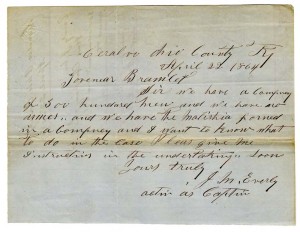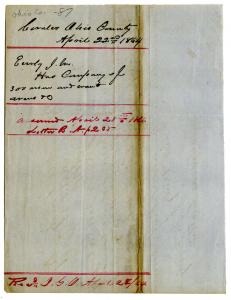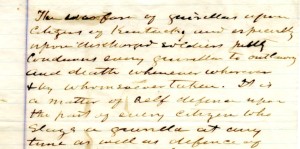Click here to view this Subject Guide in the new Civil War Governors interface.
KYR-0001-003-0003 – William L. Hurst to Thomas E. Bramlette, Oct. 6, 1863
[W]e have just received information at this office that the military forces known as the 40th Kentucky Regt now Stationed at the Town of Grayson in Carter County, (distant about 25 miles from this place) are ordered to move immediately & Station at Mountsterling Ky, which when they are thus removed will leave this part of the Country exposed to the Raids of Rebel Guerrillas…. I find that they eighth & ninth Congressional Districts of Ky have furnished more Volunteers than any other part of the state & have received less Protection than any other part in fact a large section of each District have received no protection at all but the Government through an erroneous disposition of the forces intended for the protection of that part of the state have suffered those people to be robbed murdered and the Country almost desolated by the Rebel Guerrillas East Tennessee has not suffered worse than the People of Morgan, Wolfe Breathitt and adjoining Counties
KYR-0001-003-0050 – Brutus J. Clay to Thomas E. Bramlette, Jan. 15, 1864
The subject of recruiting Negro soldiers for U S service, in Kentucky. It is rumored here that Agents have been sent from other states for that purpose. This thing of plundering our people ought & should be stopped if possible, even recruiting for our own quota would be injurious & demoralizing to our Slave population by the consent and approval of the owner himself I think a firm stand taken by you against it, would have a good effect and even prevent the U. S. Government, from attempting it in our State.
KYR-0001-003-0077 – William S. King to Thomas E. Bramlette, Feb. 21, 1864
In view of the frequent applications made at this office, by the destitute families of volunteers in Kentucky regiments, for relief which the Federal Military Commanders have no authority to provide; and in asmuch as this destitution is caused by the neglect of soldiers to transmit much,—or, in most cases any part,—of their pay to their families for their support; I venture to suggest to Your Excellency, that enquiry be made whether the allotment system; whereby each soldier devotes a stated portion of his pay for the support of those dependent upon him, is carried out in the various regiments; or that such other action may be had, to prevent this needless pauperism and distress, as to Your Excellency may seem meet and proper.
KYR-0001-003-0083 – Volney Baker to Cicero Maxwell, Apr. 5, 1864
During last court, all the Judges presented to the Grand jury, which was Entirely secession; and two of the men, who presented the Judges were the, Circuit Judge, and the County Judge—The entire Court was one of treason, and numberd out with traitors; … The meanest set of secessionists that ever existed under the canopy of Heaven, live in this immediate section of Ky; and we must adopt means, & severe ones too, to prevent a resistance which is almost sure to take place sooner or later, unless prevented
KYR-0001-018-0019 – N. Wickliffe to Beriah Magoffin, Jun. 11, 1861
I have just resigned my position as an officer in the United States Army. I am impelled to this course for the reason that that army is being concentrated and used for the subjugation of the Southern people who have my entire sympathy. I believe it is proper for me, here, to add that the time has come to pass when Southern blood is sufficient to attaint officers of the army; and unless they subscribe to new oaths, join bond in denouncing their late comrades of the south (who were the best men of the Army) as traitors, and invoke a war of extermination on their own people, and kindred suspicion and proscription are put upon them. I am unable at this distance to understand the exact position that Kentucky occupies in the great struggle between the
two sections, but I cannot believe that she can or will remain long a neutral spectator
KYR-0001-028-0015 – E. W. Hawkins to James F. Robinson, Aug. 23, 1862
At the time of the first call of the President for volunteers, several citizens of this city immediately volunteered in the famous Ninth Ohio Regiment under the lamented Robert L. McCook, there being no Kentucky regiments then in the field. … These men have shared all the dangers of the severe campaign of Western Virginia, and partook in the splendid Bayonet Charge, which decided the day at Mill Springs, where Kentuckians participated in the glory. They are “Military Men.”, the Lieutenant having served in Germany for a number of years, and the other two having acquired their knowledge during the present war. … The regiment would be exclusively German, who would flock under the banner of these well tried men with alacrity from all parts of our state.
KYR-0001-028-0040 – Rob Morris and S. W. Hunt to James F. Robinson, Sep. 9, 1862
The Undersigned have enjoyed many military opportunities for military experiences—the former in Texas during the guerilla warfare of 18436-40, the latter for more than 30 years in the organizing and governing militia corps in this Kentucky. … They therefore propose to raise a Regiment of militia for 3. months service … We will go wherever your Excellency directs and subsist on the country trusting on the bounty of Union men and the fears of disloyal men to feed us. If allowed to operate in the section above indicated we will guarantee to afford an efficient military police there—to restore the respect for State and Federal authority now so sadly shaken,—preserve the publlic records, overawe the disloyal and in all the hearts of true men.
KYR-0002-020-0022 – Julius H. Alexander to James F. Robinson, Apr. 24, 1863
Theare is a memorial sent to you by a few Officers of this Regt recomending Major Bradley to Lieut Colonel of this Regt permit me to say in this note to your Excellency that Major Bradly is not qualified to fill the office that he no hoalds, … and again he doo not know the first Lesson of a Trooper I have Privats in my Comp. that understands Military Tastics then the proposed Lieut Colonel. I have noting to say about myself & non have to say abut me as I am only a Foreigner by Birth, & have to du all the duty, & keept in the Dark.
KYR-0002-022-0077 – Isaac Fitzpatrick et al. to Thomas E. Bramlette, Jun. 27, 1864
Dear Sir we the undersigned citizens of Johnson County State of Ky Between the ages of eighteen and forty five and now in the Military service of Ky camped at Louisa Ky Respectfuly represents and showeth that we are not satisfied with our present colonel Burgess Preston who was appointed to said position we therefore ask that we have the privilege of exercising our Election Franchise and choosing from among our ranks at our next august Election a Colonel and Lieutenat Colonel … If these are our rights we Respectfully ask them If not we humbly acquiesse as loyal citizens to the laws of our country
KYR-0002-022-0121 – C. Brock to Thomas E. Bramlette, Aug. 16, 1864
Being Judge of this County, the people think it is proper & right that I should make inquiry & endevor to ascertain the number of negroes who are credited to this (Montgomery) County on the rolls in the state Military department at Frankfort. There ^were^ recruited here during the spring from 125 to perhaps 175 negroes, by the U. S. Military Authorities. Now I desire to know how many we have credit for.
KYR-0002-024-0065 – Curran Pope to James F. Robinson, Oct. 9, 1862
In consideration of the unanimous and strongly expressed wishes of the officers of this Regt who took part in the late battle of Chaplin Hills and of the very gallant conduct on that occasion of Capts Joseph. R. Snider Co “B” and Henry F Kalfus Co “D,” I earnestly recommend that the former be commissioned as Lieut Col and the latter as Major of the Regt, and urge that commissions be immediately forwarded to them to date from Oct 9. 1862, and withdraw any other recommendation made by me, and advise that if any other appointments have been made, they be immediately cancelled.
KYR-0002-036-0039 – Robert Brown, Affidavit, Aug. 12, 1865
Capt Bridgewater made the promise that when the men captured anything it should belong to them. The promise was made by the then Cap B that all money arising from the sale of these guns ^(some three or four)^ and pistols should be placed to the credit of the Battalion to be equally divided at a future time. states that he saw Capt B. take about $70 in money from a man killed by the command.
KYR-0002-038-0024 – George H. Travis to Thomas E. Bramlette, Aug. 22, 1864
I went to the “front.”—joined my Command, the 2nd Ky. Battery, and was wounded last April, in a skirmish, in the left arm. My arm was amputated. … Disiring my discharge, I made application for Commission in Colored Troops. in order to get out of the service as a Com. Officer, by resignation. Yet I do not approve the arming of negroes. … I request you to Commission me in some Ky. Regt. to enable me to resign—to get out of service. Will you do so? Having the gift of oratory, I desire to stump the States of Ill. and Ind. for the Candidate of the Chicago Convention. But I cannot do so, as I am now situated. You can enable me to do so. Will you? You can see what influence a Private soldier can have on the Stump who has lost a limb in the service.
KYR-0002-042-0023 – Daniel W. Lindsey to Edwin M. Stanton, Jul. 11, 1864
Owing to the unsettled state of affairs in Kentucky, his Excellency Gov. Bramlette, proposes to organize a State force to consist of three Battalions; one to be assigned to duty in East Ky, one in the vicinity of Paducah, and one at Frankfort. These forces are intended to aid and assist the Federal troops, and shall be held subject to the call of the District Commander for any service in the State. The Governor proposes to sustain this force at the expense of the State, but to avoid competition with the General Government in the market for supplies, he requests me to ask that you will order the proper United States officers in Kentucky to issue both Commissary and Quartermaster supplies to this force upon requisition, approved by him, to be paid for by the State in General Settlement.
KYR-0002-042-0087 – John W. Finnell, Receipt to William E. Cox, Sep. 4, 1862
Sept. 4. To hire of men, drayage & c. & c., in in removing Books & furniture from Adjutant General, Military Boards & Quartermasters Department $15 50
KYR-0002-042-0091 – Daniel W. Lindsey to John Boyle, Jun. 18, 1864
General: I have the honor to submit the following report, of the defense of the State Capital, against the recent attack of a detachment of Genl. John H. Morgan’s guerilla forces—… On the morning of the 9th the train containing the public property, with a guard composed of the clerks of the various offices, and volunteers from the Militia, and strangers in the City…started for Louisville. When nearing Pleasureville the road was discovered to be on fire. The engine was immediately reversed, and the train attacked by guerillas. … The enemy were found to be occupying all the roads leading into the city. Several attempts were made by them to approach the Arsenal through the Cemetery and by the Railroad, but the shells thrown from the guns at the Fort and a gun at the Arsenal kept them back. … The presence of his Excellency the Governor and Attorney General Harlan animated the men and contributed very materially to the defence of the Fort.
KYR-0002-042-0102 – Joshua F. Speed to Salmon P. Chase, Mar. 22, 1862
I have filed with the 3d Auditor, in the Treasury Department,—vouchers for money expended by the State of Kentucky, in and of the Govt. in suppressing the rebellion, amounting to Seven Hundred and Eighty six thousand, one Hundred and Ninety three 11/100 Dollars….I am also furnished, with a balance sheet, by our Military Board, showing that they have up to this time, expended in paying, subsisting, arming and equipping, the Kentucky Volunteers.— One Million Seven Hundred and Seventy-two thousand, Six hundred & Seventy-nine 55/100 Dollars…. What I desire, in behalf of the State, whose agent I am, is — that the Government will pay us forty per. cent. of our expenditures. — Out of the remainder, we desire to settle Kentucky’s proportion of the War tax:
KYR-0002-211-0027 – Samuel G. Suddarth, Receipt to Rutha R. Manion, Apr. 27, 1865
To Cooking and Washing for the State Military Hospital for the Month of December 1863 and month of January 1864 $24 00
KYR-0002-218-0266 – Thomas E. Bramlette to Daniel W. Lindsey, Nov. 5, 1864
It is of the utmost vital importance to the cause of our Country, that peace be preserved in Kentucky; and that there should be no semblance of Collision between the Civil and military authorities of the State and those of the Federal Government. … To my utter surprise Genl Burbridge without my being able to get a line from him in explanation or otherwise of his intentions has assumed a hostile position—menacing towards the State authorities and forces; and with no shadow of authority or just pretence has been threatening to disband them; and in various ^ways^ apparently sought to provoke collision. A collision with him would be a matter of small moment but I cannot and will not have a collision with the federal forces under his command…and for the additional reason that no folly of others shall make me collide with my Government.
KYR-0002-219-0010 – Madison C. Johnson to John B. Temple, Oct. 1, 1861
We have placed to the Credit of the Treasurer of Ky for the use of the Military Board the sum of two hundred and fifty thousand dollars—for which we received your certificate according to Law. At this time we have not more than about one hundred thousand dollars in Bank notes, having burnt our notes for safety. … Will you please advise me in what time & manner you expect to draw it out. I presume it will remain on deposit here until your Board disburses it.
KYR-0002-225-0041 – William R. Thompson to Thomas E. Bramlette, May 28, 1864
My son Lt John V. Thompson, has been trying to raise a company for the ten thousand troops you called for, but there seems not to be much disposition to volunteer the rebels & their sympathies do every thing they can to discourage it; & you have taken the right course, just make them walk right in, a man that wont fight for his country ought not to live in it. I have greatly more respect for the men who are in the field with Jeff. Davis, than for those who are among us plotting the overthrow and destruction of the Government that protects them & all they possess, for them I have no respect, they have been handled with gloves too long.
Want to see more interesting topics? Visit the Subject Guides page.

 Jesse M. Everly, the author of this letter now housed at the
Jesse M. Everly, the author of this letter now housed at the  On the reverse of Everly’s note is the clerk’s annotation when this letter was received and filed in Frankfort—in the very arsenal building where this document is housed today. By this time in the war, military filing procedures were standardized and predictable. The clerk (in order, down the page) noted the date and place of the letter, recorded the author and a brief summary, listed the date of response and the book where the outgoing letter was copied, and logged the date of reception at the office.
On the reverse of Everly’s note is the clerk’s annotation when this letter was received and filed in Frankfort—in the very arsenal building where this document is housed today. By this time in the war, military filing procedures were standardized and predictable. The clerk (in order, down the page) noted the date and place of the letter, recorded the author and a brief summary, listed the date of response and the book where the outgoing letter was copied, and logged the date of reception at the office.